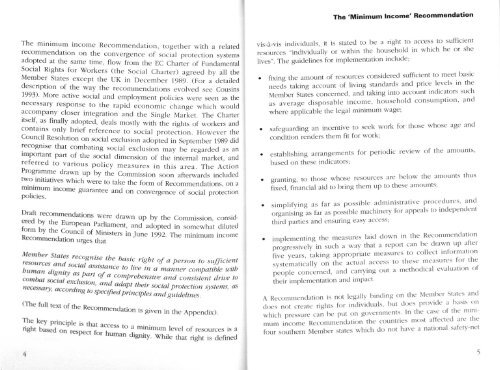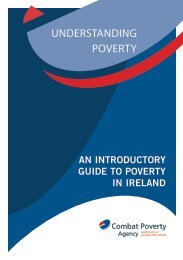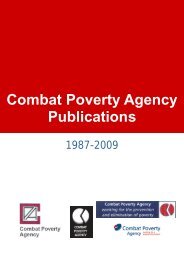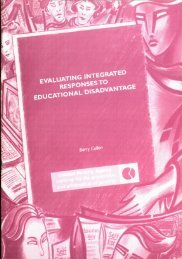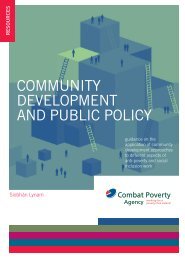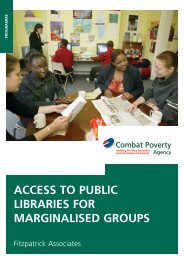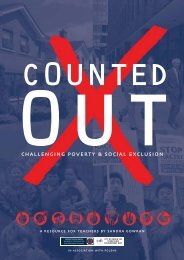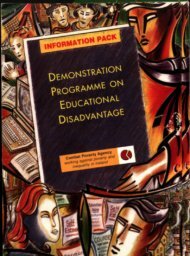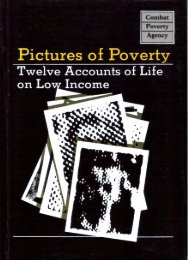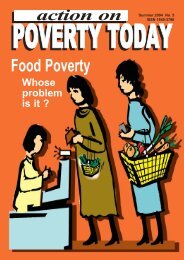Ireland and the Minimum Income Guarantee - Combat Poverty Agency
Ireland and the Minimum Income Guarantee - Combat Poverty Agency
Ireland and the Minimum Income Guarantee - Combat Poverty Agency
You also want an ePaper? Increase the reach of your titles
YUMPU automatically turns print PDFs into web optimized ePapers that Google loves.
The '<strong>Minimum</strong> <strong>Income</strong>' Recommendation<br />
The minimum income Recommendation, toge<strong>the</strong>r with a related<br />
recommendation on <strong>the</strong> convergence of social protection systems<br />
adopted at <strong>the</strong> same time, flow from <strong>the</strong> EC Charter of Fundamental<br />
Social Rights for Workers (<strong>the</strong> Social Charter) agreed by all <strong>the</strong><br />
Member States except <strong>the</strong> UK in December 1989. (For a detailed<br />
description of <strong>the</strong> way <strong>the</strong> recommendations evolved see Cousins<br />
1993). More active social <strong>and</strong> employment policies were seen as <strong>the</strong><br />
necessary response to <strong>the</strong> rapid economic change which would<br />
accompany closer integration <strong>and</strong> <strong>the</strong> Single Market. The Charter<br />
itself, as finally adopted, deals mostly with <strong>the</strong> rights of workers <strong>and</strong><br />
contains only brief reference to social protection. However <strong>the</strong><br />
Council Resolution on social exclusion adopted in September 1989 did<br />
recognise that combating social exclusion may be regarded as an<br />
important part of <strong>the</strong> social dimension of <strong>the</strong> internal market, <strong>and</strong><br />
referred to various policy measures in this area. The Action<br />
Programme drawn up by <strong>the</strong> Commission soon afterwards included<br />
two initiatives which were to take <strong>the</strong> form of Recommendations, on a<br />
"olides" 1 mC ° me gUarantee <strong>and</strong> on convergence of social protection<br />
e ^ , reC ° v mi " endation s were drawn up by <strong>the</strong> Commission, consider<br />
h r ^Ur ° pean Parliament, <strong>and</strong> adopted in somewhat diluted<br />
Remmm H<br />
C0 ° f MiniSterS in J une !992- * minimum income<br />
Kecommendation urges that<br />
Z b Zs S LZ S reC T iSS <strong>the</strong> baSiC W of a person to sufficient<br />
^ZTZZZVZT 6 to Hv l in a manner compat *<br />
J<br />
combat sorL/'l /<br />
com P re^nsive <strong>and</strong> consistent drive to<br />
^ ^ ^ S ^ r l ^ Asocial protection systems, as<br />
ry, according to specified principles <strong>and</strong> guidelines.<br />
(The fu„ te Xt of <strong>the</strong> Recommendation fe ^ ^ ^ ^ ^<br />
right bJsed'on^esoec^forI 065 '<br />
t0 * minimum level of resources is a<br />
respect for human dignity. While that right is defined<br />
vis-a-vis individuals, it is stated to be a right to access to sufficient<br />
resources "individually or within <strong>the</strong> household in which he or she<br />
lives". The guidelines for implementation include;<br />
• fixing <strong>the</strong> amount of resources considered sufficient to meet basic<br />
needs taking account of living st<strong>and</strong>ards <strong>and</strong> price levels in <strong>the</strong><br />
Member States concerned, <strong>and</strong> taking into account indicators such<br />
as average disposable income, household consumption, <strong>and</strong><br />
where applicable <strong>the</strong> legal minimum wage;<br />
• safeguarding an incentive to seek work for those whose age <strong>and</strong><br />
condition renders <strong>the</strong>m fit for work;<br />
• establishing arrangements for periodic review of <strong>the</strong> amounts,<br />
based on <strong>the</strong>se indicators;<br />
• granting, to those whose resources are below <strong>the</strong> amounts thus<br />
fixed, financial aid to bring <strong>the</strong>m up to <strong>the</strong>se amounts;<br />
• simplifying as far as possible administrative procedures, <strong>and</strong><br />
organising as far as possible machinery for appeals to independent<br />
third parties <strong>and</strong> ensuring easy access;<br />
• implementing <strong>the</strong> measures laid down in <strong>the</strong> Recommendation<br />
progressively in such a way that a report can be drawn up after<br />
five years, taking appropriate measures to collect information<br />
systematically on <strong>the</strong> actual access to <strong>the</strong>se measures for <strong>the</strong><br />
people concerned, <strong>and</strong> carrying out a methodical evaluation of<br />
<strong>the</strong>ir implementation <strong>and</strong> impact.<br />
le with<br />
A Recommendation is not legally binding on <strong>the</strong> Member States <strong>and</strong><br />
does not create rights for individuals, but does provide a basis on<br />
which pressure can be put on governments. In <strong>the</strong> case of <strong>the</strong> minimum<br />
income Recommendation <strong>the</strong> countries most affected are <strong>the</strong><br />
four sou<strong>the</strong>rn Member states which do not have a national safety-net<br />
i<br />
5


